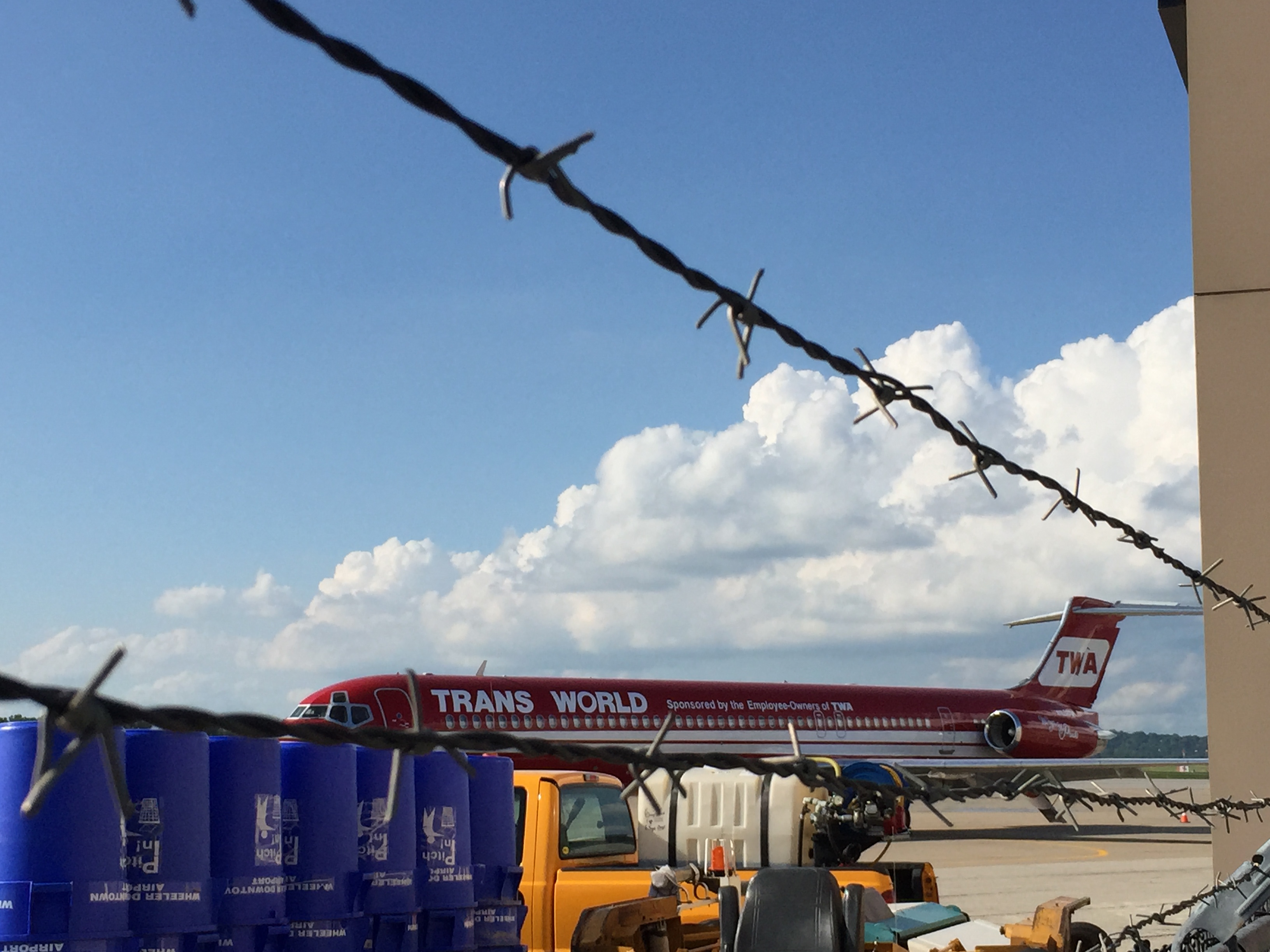TWA Has Been Defunct For Almost 15 Years, But A Lawsuit Lives On….

I really can’t believe this is still going on. But, some background first.
Back in the days of airline regulation, TWA was a force to be reckoned with. They had a substantial network in Europe and plenty of flights back and forth from the US to fuel it. They also had a decent network in the US to move people to gateway cities to fill those planes shuttling across the Atlantic.
Then, deregulation happened, and TWA never really did have their feet underneath them to compete the way they needed to. Depending on who you talk to, Carl Icahn was a big part of the reason the empire that Howard Hughes helped build fell apart in the 90s. In the interim (and after deregulation), TWA decided that it would move its Midwest operations to St. Louis from Chicago.
As TWA breathed it’s last gasp, American Airlines stepped in and purchased the airline. And, this is where contracts and worst-case scenarios come into play. One of the biggest problems the unions have dealt with over the years is seniority, especially when it comes to merging two airlines and their employee bases. A union representing the TWA pilots negotiated on their behalf, gaining the right to have a “fence” of sorts around St. Louis, meaning their pilots would maintain the most privileged routes out of that hub.
The writing was on the wall pretty quickly that American would not be operating two midwest US airport hubs, and St. Louis was “de-hubbed”. So, what happened to all those TWA pilots? They got tacked to the bottom of the American Airlines seniority list. This was around 9/11, and when the industry drastically downsized, many of these pilots were furloughed. Game over, except for the lawsuits that continue 14 years later. This is a very condensed version of the issues at hand.
Fast forward to today and the pending lawsuit that the TWA pilots are still waiting for answers on while they sue former union representation, and even American Airlines for being complicit.
The bankruptcy judge in charge of the American Airlines bankruptcy filing finally ruled on the most current lawsuit, dismissing 4 of the 10 claims the plaintiffs (ex-TWA pilots) had:
U.S. Bankruptcy Judge Sean Lane has refused to toss out a lawsuit by former Trans World Airlines pilots who accused the Allied Pilots Association of failing in its “duty of fair representation” and American Airlines of “colluding” with APA.
But Lane did rule against the TWA pilots in their efforts to challenge the seniority list that put close to half of them far down in the seniority list and the rest of them behind all American pilots after AA acquired TWA in April 2001.
….
The lawsuit stemmed from American’s decision in 2012 – while in bankruptcy proceedings – to close its St. Louis hub. That undercut some protections, Supplement CC to the Allied Pilots Association contract, that had been negotiated in the wake of American’s 2001 acquisition of TWA.
While that supplement locked in the lower seniority numbers given to TWA pilots, it provided a “fence” around the St. Louis base. That fence gave the TWA pilots preferential seniority for St. Louis flying over non-TWA pilots among the American pilot group.
With the base closing, the 650 ex-TWA pilots at that base faced being dropped into the general pool of AA pilots, with their much lower seniority numbers.
Terry’s team was nice enough to post the entire response from the judge here.
Though there have been many rulings in this case, the ex-TWA pilots are still pushing forward. There was a decision by a jury in 2011 that the union had wronged the pilots. There were and are plenty of strong feelings. One of the two unions involved, the ALPA, actually came to a settlement agreement with the pilots in early 2014. $53 million may sound like a lot, but when you’re talking about hundreds of pilots and years of litigation, I don’t suspect anyone is getting rich from that settlement (okay, other than the lawyers).
It’s not even the first time this judge has ruled for or against (or both for and against) the TWA pilots. There was an earlier decision that went against them in 2014. Though I can’t be sure from my reading of the material, my guess is that the current lawsuit stemmed from lessons learned when the judge rejected their claims back in 2014.
Reading through the text of Judge Lane’s decision, I thought this part was interesting.
More specifically, American contends that where “plaintiffs elected not to file a petition to vacate or modify the arbitration award, they could not ‘now collaterally attack the . . . award in the context of [a] hybrid claim for breach of the duty of fair representation.’” Motion to Dismiss, at 14 (citing Musto v. Transp. Workers Union of Am., 818 F. Supp. 2d 621, 640 (E.D.N.Y. 2011)).
The Court disagrees. In fact, the case law recognizes that a duty of fair representation claim can be brought independent of a request to vacate an arbitration result.
Essentially, he’s denying American’s claim that the Plaintiff’s motion should be dismissed because they didn’t elect to challenge the original arbitration award. The judge soundly rejects this claim. There are a few more nuanced arguments the judge leaves open.
I find it interesting that the judge still finds that American Airlines could have caused harm (or been complicit with the unions). And, I’ll be interested to see where the lawsuit ultimately ends up.

In fairness, as much of a number as Icahn may have done on TWA, he’s not why the airline failed. The simple reason was St. Louis. That airport simply didn’t have high yield O/D traffic because the city faced a long term decline. When American bought the airline, TWA was in its *third* bankruptcy. There were other factors that didn’t help the airline of course but it suffered from the weakest hub of major airlines.
There’s no doubt STL was a big issue. But, I think you’re underestimating the debt load he put on the business when taking it private. And, admittedly, until tonight, I didn’t really have full knowledge/recollection of Karabu.
Having lived through the STL TWA / AA hub years there I do blame Icahn but he wasn’t the sole reason. It also falls to the state of Missouri and City of St. Louis for failing to secure STL (or even MCI) as hubs over the years with tax incentives and political fighting. Just look at recent years with the proposed China Air Hub at STL failure.
I also would blame AA. It seemed that they never intended to keep STL as a hub when they bought TWA. I feel that AA will eventually do the same in Phoenix.
As far as the lawsuit. It’s interesting this has dragged on so long. I wonder if the judge, attorneys or ex-TWA pilots will outlive the lawsuit.
Dan, I don’t think Icahn was the only reason, just a pretty decent chunk of what went wrong. I agree that the state could have done more to help. I don’t see a reason to blame AA. Not trying to look with rose colored glasses, but TWA was already seriously fried by that point. And, I can’t imagine anyone believed they would keep two hubs that close to each other. I think it will take longer than we expect for PHX to wind down, but it will.
Being a native St. Louisan, a large part of the blame was very much outside of anyone’s control. While STL could have originally been utilized as a secondary Midwest airport for AA as ORD was plenty congested at the time, 9/11 pretty much sunk any expected growth in air traffic. With having this drop in air traffic, there truly was no need for a second Midwest hub in STL. However, Icahn did more than a number on this great airline to destroy what little it had going for it with its international routes.
Joe, thanks for weighing in. No question that a post 9/11 air travel industry (much smaller) made lots of things untenable. But, I don’t think TWA ever had to get to the point where it got purchased by AA if there had been better decision-making in the 90s. Not saying it definitely could have been fixed, but I suspect the chances would have been much greater with more sound management prior to AA arrived as a suitor.